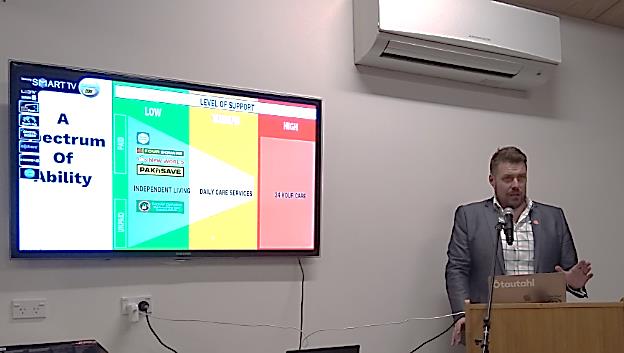The Hāpai Foundation

Tim Jones, from the recently formed Hāpai Foundation that supports people with intellectual challenges to live full and happy lives, addressed us last week.
“Our approach is to try to help people think differently about intellectual disability” explained Tim.
In New Zealand deinstitutionalisation took off in the 90’s with the aim being to help people live in their families, communities and schools as much as possible.
In recent times fundraising has become increasingly tough as New Zealand has one of the largest number of organisations seeking funds in the world.
A welfare council was set up in the past to support changes in how Templeton operated which helped bring a diverse range of organisations together. This is still a work in progress.
“Our premise is that everyone deserves a fair go and we are a voice for those who are often without one” noted Tim.
“We see intellectual disability as better described as those who have challenges in their daily activities that most of us take for granted. Being a small number of people in the wider New Zealand community makes it hard for organisations like ours when fundraising” explained Tim.
There is a wide range of support available at all levels but it is the ones who sit in the middle that the organisation aims to ensure remain visible.
Their guess is that there are approximately 4000 people in Canterbury that have an intellectual disability. While there is a concentration in the Southwest, they are also quite widely spread throughout greater Christchurch and most are in need of support.
The company’s focus is on inclusivity which can be a challenge for their clients as they often struggle with quite simple things like going out for a coffee in a retail setting.
They have therefore decided to promote the use of an access card that rates local locations on their suitability for their clients. Countdown, for example, offers one hour week of quiet time which is a good start.
They are beginning to talk to lots of companies regarding their approach promoting what is called the Kiwi Able Card that allows a person with challenges to bring along a support person. Another option they are looking at is the Mobility Card which encourages holders to use supportive businesses.
Last week they were supported by the Minister who is keen to back this process. Their sales pitch is that this meets the needs a significant proportion of the population who can support businesses during current tough times.
“We are hoping that our approach will increase awareness as this is a good way to support the clients we serve and to look at who can support us financially as we move forward” concluded Tim.
Doug thanked Tim for his presentation, passion and determination to help those who often do not have a voice for themselves.